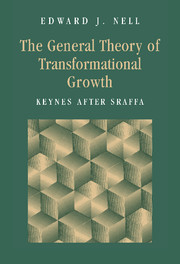Book contents
- Frontmatter
- Contents
- Preface
- Acknowledgments
- Part I History or equilibrium?
- Part II Method and approach: the active mind
- Part III Money and the Golden Rule
- PART IV The wage-profit trade-off
- Part V Investment and Mass Production
- Part VI Money and fluctuations in the modern economy
- Conclusions
- Bibliography
- Index
Part I - History or equilibrium?
Published online by Cambridge University Press: 21 January 2010
- Frontmatter
- Contents
- Preface
- Acknowledgments
- Part I History or equilibrium?
- Part II Method and approach: the active mind
- Part III Money and the Golden Rule
- PART IV The wage-profit trade-off
- Part V Investment and Mass Production
- Part VI Money and fluctuations in the modern economy
- Conclusions
- Bibliography
- Index
Summary
For the last century, economic analysis has been wedded to the idea of equilibrium, in spite of the evident fact that most economic relationships are in flux. The theory of steady growth was developed over a quarter century during which, in the advanced countries, the share of agriculture fell dramatically, manufacturing first rose, then leveled off, and then began to fall, while services and especially government rose, and changed character. Growth was never even approximately steady. Nor did it simply fluctuate. Instead, the composition and character of the economy changed according to a definite pattern, which rested, in turn, on a core structure that remained largely unchanged. This core consisted of – and is today – the set of basic value relationships between wages, prices, and profits, determining the value of capital. This is what provides the continuity within the processes of change.
The study of such patterns of directed change, and the forces that determine them, is the subject of the theory of transformational growth. The first chapter argues that theory should assign the market the role, not of allocating resources, but of generating forces that bring about innovations. These innovations, in turn, change the way markets work – how they adjust – creating new problems, and thus new kinds of pressures to innovate. Evolutionary forces can be seen at work. Three historical periods can be distinguished – with a fourth perhaps on the horizon.
- Type
- Chapter
- Information
- The General Theory of Transformational GrowthKeynes after Sraffa, pp. 1 - 2Publisher: Cambridge University PressPrint publication year: 1998



